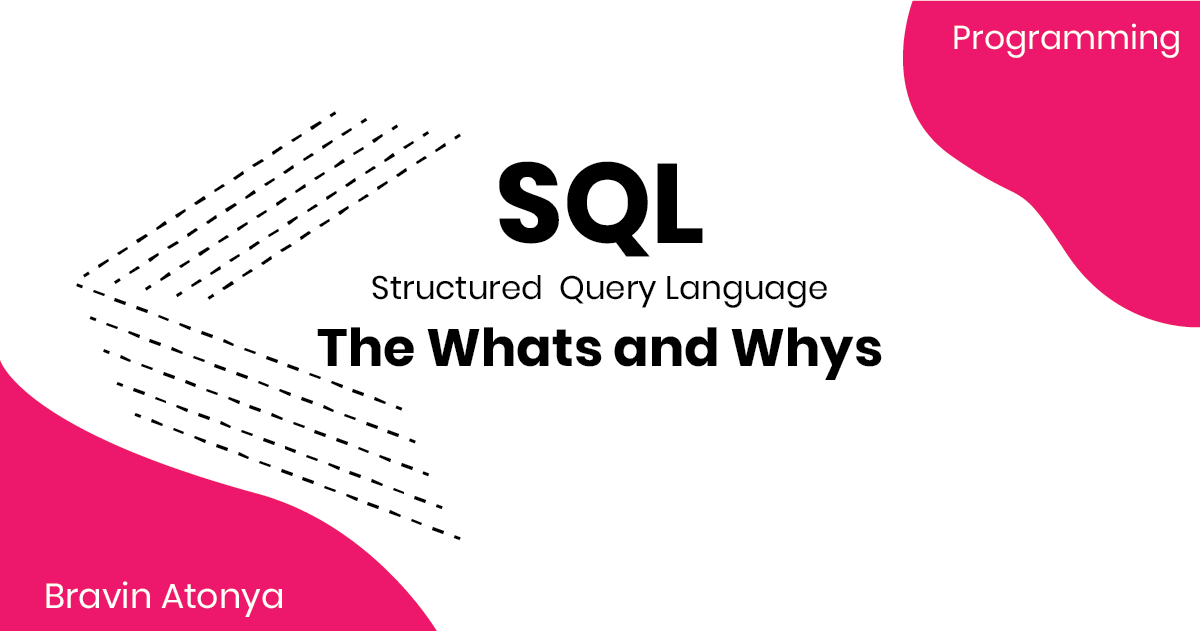Introduction to SQL
 bravin atonya
bravin atonya
Introduction
The name SQL stands for Structured Query Language. It is pronounced "S-Q-L" or "sequel". SQL is a computer language designed to get information from data that is stored in a relational database.
SQL as a declarative computer language
SQL is however different from most other computer languages. With SQL, you can describe the type of information you want. The computer then determines the best procedure to use to obtain it and runs that procedure. This is what is called declarative computer language because the focus is on the result. All you need is to specify what the result should look like. The computer is allowed to use any method of processing as long as it obtains the correct results. Other computer languages are on the other hand procedural. This includes languages like Python, C, Java, etc. In these languages, you describe the procedure that will be applied to the data; you do not describe the result. The result is whatever emerges from applying the procedure to the data.
Difference between declarative and procedural languages using an analogy
We can use an analogy to compare these two approaches. Suppose I take my suit to the laundry. With a declarative approach(used by SQL), I can say what I want: "I would like my suit to be cleaned". With the procedural approach(used by Python), I cannot say that. I have to say how the result can be obtained and give a specific procedure for it. That is, I have to say how to wash the suit. What I have to say is "Use the spot treatment liquid to dab any noticeable stains. Place the suits into the garment bag. Place the dry cleaning cloth into the bag. Place the bag in the dryer. Using a medium to high temperature, set the dryer for 30 minutes."
Why Learn SQL
Popularity
SQL is widely used(more than 100 software products). Once you learn SQL, you will be able to use all of these products and become one of the useful tools in the SQL wide community.
Easy to learn
One of the reasons why SQL is used so much is that it is easy to learn, relative to other computer languages. In all this ease, SQL opens the door to relational databases and the many advantages they offer.
More Powerful
SQL is the most successful declarative computer language - a language in which you say what you want rather than how to get it. There are some other declarative languages including HTML, CSS and XML, and report-generation tools, but most of them are much more limited in what they can do. SQL is more powerful and can be applied in many situations.
SQL's Best Friend
As we saw in the introduction, SQL is designed to get information from data that is stored in a relational database.
Without a relational database, SQL is as good as useless, however, if you team them up, you have the best team any developer needs.
A Relational database is one way to organize data in a computer.
The idea of a relational database was first developed in the early 1970s to handle very large amounts of data - millions of records. At first, the relational database was thought of as a back-end processor that would provide information to computer applications written in procedural languages. Today, however, the ideas have been so successful that entire information systems are often constructed as relational databases, without much need for procedural code(except to support input forms).
Advantages of a relational database
Easy data retrieval
SQL is one of the main reasons to organize data into a relational database. Using SQL, information can be obtained from the data fairly easily.
Used by many people
one of the most noticeable reasons to use SQL is that it can be used by many people at the same time. Sometimes hundreds or thousands of people can all share the data in a database. All the people can see the data and all the people can change the data (if they have the authority to do so).
Flexibility
A relational database is designed with the expectation that your information requirements may change over time. Relational databases are designed to make this type of change easy. Most computer systems are difficult to change.
App development
From the perspective of a computer programmer, the flexibility of a relational database and the availability of SQL makes it possible to develop new computer applications much more rapidly than with traditional techniques.
Products that require SQL knowledge
Major SQL products
Oracle
Microsoft Access
DB2
Microsoft SQL Server
Informix
SQL Windows
Sybase
SAS sql procedure
Fox Pro
dBase
Tandem SQL
Other SQL products
MYSQL
SQLBase
Cold Fusion
SAP
Business Objects
ODBC
Ingres
Ocelot SQL
Oslo Data
PostgreSQL
RapidSQL
XDB
SQL/DS
Mini SQL
Empress
Interbase
PrimeBase
Altera SQL server
DataScope
PowerBuilder
Summary
There are no limits in the world of SQL and relational databases. Get to learn SQL and have the sensational experience it comes with.
Subscribe to my newsletter
Read articles from bravin atonya directly inside your inbox. Subscribe to the newsletter, and don't miss out.
Written by